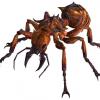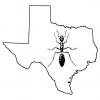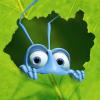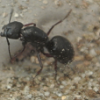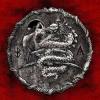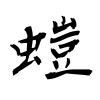I was waiting for this post.
Let me ask you something Terry. Knowing everything you know about Chromerust's ant food (which is merely chicken, hummingbird nectar, and honey), on a 1-10 scale, what would you rate it overall across-the-board in all categories?
Are those my categories?
Chicken: 10
Sugar: 10
Honey: 10
They're definitely all in there.
The only times you see fructose and sucrose being used together in literature is in pest control receptivity tests. Both being sugars and having an identical effect on ant health, there may be little cause to favor one over another. From what I've read, however, wild ants respond much more to sucrose bait traps than to fructose ones, in general.
Studying the effects different combinations of carbohydrates play in receptivity among ants, especially the inclusion of some carbohydrates rarely found in nature, such as those that may be found in aphid "honeydew," will be an important part of building on the research of Dussutour and Simpson, thereby moving from a synthetic diet that is merely healthful, to one that may prove novel and desirable for a duration greater than the standard 8 weeks during which laboratory tests are undergone.
The chicken accomplishes both roles as protein and fat. However, it is difficult to quantify nutritional values, since protein/fat composition varies between different cuts and even individual birds. This is one just one of the reasons you won't see it listed in any of the scientific journals.
The other, and more perilous reason, relates to basic food science: the fact that nearly all the protein is bound in the tough, tangled, insoluble muscle fibers of the chicken meat. While Solenopsis will break the agar cubes into small granules, feeding entire chunks to brood, many entire genera of ants may only lick the food with their tongue organs, ingesting only the sugar and some fats. Colonies that do not break the food down for storage will inevitably suffer severe malnourishment after some time. That is why it is important to take the final particle size of the proteins being used into account, to ensure they can be ingested by workers, and thus benefit the colony nutritively, even when larvae are not present.
I did already say that this diet may prove useful for S. invicta. In fact, the fastest period of growth I observed was when I was feeding my S. invicta colonies canned cat food, waxworms, and an ad libitum supply of sugar water. The other ant species the OP named have more balanced dietary requirements, however. In consequence, this diet may fail for long-term use for the majority of ants, on account of the protein/fat content coming from a single animal source that concentrates some needed nutrients, while being deficient in others, along with other attributes, also listed above.
- -
In response to Chromerust's now-hidden reply that accuses me of "...dumping all your scientific garbage on everybody," all I can say is that my entry into this discussion was not a personal attack, but rather the encouragement of those who may come to read or be involved with this discussion, that a more methodical and controlled approach is required when it comes to the development of a synthetic diet for ants. Simply coming in and proclaiming that sweetened, blended chicken is the savior to all antkeeper's problems, and wondering why some brilliant scientist didn't tell us all sooner, just makes you sound like these fine folks.
Calling science "garbage" does nothing but disrespect the millions of people, past and present, who have dedicated their lives toward the pursuit of knowledge that furthers the common good, making life as you know it not only possible, but also infinitely worth living. Blatant and open disregard and contempt for science and knowledge, in all its many forms, is exactly what is keeping the antkeeping community stuck in the 1960's—so I pity those who would continue to perpetuate that mindset.
lol, just gonna put the up, we have fire ants in the house in the summer and we have cat, now when one cat hacks a hair ball on the floor at night the next day there is like 100 to 200 ants all over that stuff.... lol gonna try and keep some of it 4 my fire ant colony.... (when i get it going)
Ants are not eating the hair, but rather the liquid stomach contents that were expelled along with it. You will elicit the same effect by feeding your ants the same foods you feed your cat.
Edited by drtrmiller, February 11 2015 - 5:40 PM.

